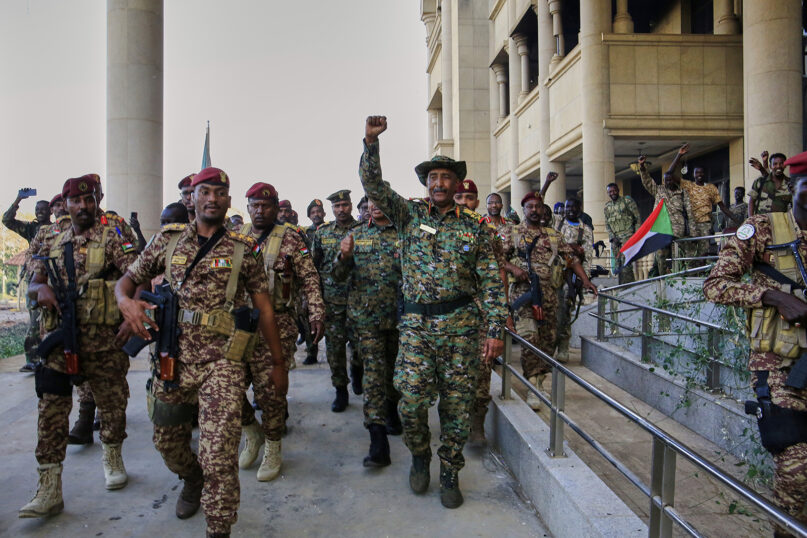NAIROBI, Kenya (RNS) — Although the All Saints Anglican Cathedral in Khartoum suffered huge damage in the two-year battle for the Sudanese capital, the country’s archbishop is relieved the structure was never bombed.
Speaking on Tuesday (April 1), days after the Sudanese Armed Forces, the national army, had recaptured the city from the paramilitary Rapid Support Forces, Ezekiel Kondo, the archbishop of the Episcopal (Anglican) Church of Sudan, told RNS he had received information about the state of the cathedral and the damage it had sustained.
“The damage is huge. Archbishop’s residence, dean’s house, and offices are all destroyed and looted. Praise God the building is not bombed,” Kondo, 68, told RNS from Port Sudan, in eastern Sudan, where he had been forced to flee two years earlier. “It will cost millions of dollars to repair the church.”
According to the archbishop, Christians are yet to return to the cathedral because the army has not declared the area safe.
“There may be land mines left behind by the paramilitary. Basic services such as water and electricity have not been restored,” said Kondo.
On March 26, Gen. Abdel-Fattah Burhan, the leader of the Sudanese Armed Forces, announced that his forces had taken the city back from Mohamed Hamdan Dagalo and the Rapid Support Forces, raising hopes that the bloody civil war between the two factions of the military government might move on from the area.
However, a month earlier, in Nairobi, the Rapid Support Forces and allies had announced plans to form a parallel government. The Sudanese Armed Forces now controls the north and the east, while the Rapid Support Forces controls the south and the expansive Darfur region in the West, creating an impression of a split in Africa’s third largest country. Dagalo is a former leader of the Janjaweed, a group of Arab militias widely accused of committing mass atrocities in the Darfur region, recognized by the United Nations as genocide in 2004.

Sudan’s military chief, Gen. Abdel-Fattah Burhan, center, is greeted by troops as he arrives at the Republican Palace, recently recaptured from the Rapid Support Forces paramilitary group, in Khartoum, Sudan, March 26, 2025. (AP Photo)
Like other churches and some mosques, the All Saints Anglican Cathedral has been caught in the fight for control of Khartoum and northeastern Sudan.
On April 15, 2023, Kondo, along with other church leaders and their families, had been in the cathedral preparing for the Sunday service when the paramilitary seized the church building and turned it into a military base. This past September, the archbishop told RNS the paramilitary had turned the cathedral compound into a graveyard, chopping pews for use as firewood.
In Sudan, an estimated 5% of the 50 million population are Christians. The rest, 95%, are Sunni Muslims.
While the war has forced the shutting of an estimated 165 churches, some mosques have also been targets. On March 24, the paramilitary allegedly shelled a mosque in Khartoum, killing at least five people and injuring dozens of others.
According to reports, the militaries have also arrested numerous Muslim clerics who have advocated for peace. At least 12 mosques in Khartoum, El Fasher and El Geneina have been affected.

Archbishop Ezekiel Kondo. (Photo by Anglican Communion News Service)
“The religious sites and the clerics are being caught in the crossfire in a war between two generals who are Muslims. It is not a religious war,” said Sheikh Abdullah Kheir, an imam and a senior university lecturer in various Kenyan universities. “When you look at what is happening, it is not only Christians who are suffering, but Muslims too. I have seen Muslim women being bombed as they try to flee.”
Church sources indicate that St. Matthew’s Catholic Church in Khartoum has also been badly damaged, with the interior and exterior affected. However, the structure is still standing. The 1908 cathedral, near the El Mek Nimir Bridge, is the seat of Archbishop Michael Didi Adgum Mangoria of Khartoum. Mangoria is also living in Port Sudan after having been forced out by the war.
“The building is intact, but there are no benches in the sitting area. Instead, there is rubbish,” said the Rev. John Gbemboyo Joseph Mbikoyezu, the coordinator of the South Sudan Catholic Bishops’ Conference.
Despite persistent calls by church leaders for peace, there is no ceasefire agreement in sight, and the two generals are promising to fight on.
The exact death toll in the Sudan conflict is still unknown, but organizations have put the figure between 61,000 and 150,000 people. The conflict has displaced an estimated 12 million people and created one of the world’s worst humanitarian crises, according to the U.N.















